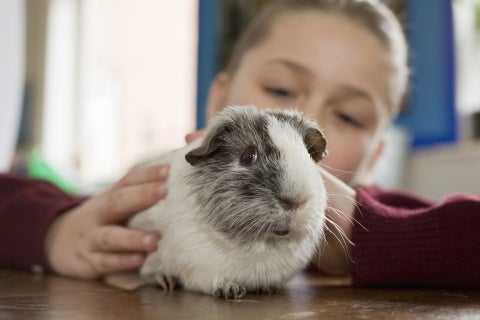Understanding Guinea Pigs
A. Characteristics and Behavior
Guinea pigs, or cavies, are miniature, social rodents native to the Andes region of South America. They come in various breeds and coat types, such as short-haired, long-haired, and hairless. Typically, they exhibit docile and friendly behavior, making them popular as pets, especially for families with children. Understanding their characteristics, such as their need for companionship and their communication methods (such as squeaks, purrs, and body language), is crucial for providing a suitable environment and ensuring their well-being.
B. Basic Care Requirements
Proper care is essential for keeping guinea pigs healthy and happy. This includes providing a spacious cage with bedding, toys, hiding spots, and a balanced diet of fresh hay, vegetables, and pellets for guinea pigs. Regular grooming, such as nail trimming and coat brushing, is necessary, especially for long-haired breeds. Additionally, access to clean water and a safe environment free from hazards are fundamental aspects of their care.
C. Lifespan and Health Considerations
Guinea pigs have an average lifespan of 5 to 7 years, although some can live longer with proper care. Like any pet, they are susceptible to various health issues, including dental problems, respiratory infections, and obesity. Regular veterinary check-ups are essential for monitoring their health and promptly addressing concerns. Providing a balanced diet, maintaining a clean living environment, and handling them gently can help prevent common health issues and contribute to a long and happy life for guinea pigs.
This section overviews the characteristics, care requirements, and health considerations for keeping guinea pigs as pets. Understanding these aspects is crucial for providing them with a suitable and nurturing environment.
Guinea Pigs for Sale: Market Overview
A. Types of Sellers
Guinea pigs can be found for sale from various types of sellers, including:
- Pet Stores: Many pet stores sell guinea pigs, offering a convenient option for prospective buyers. However, it’s essential to ensure that the store maintains proper animal care standards.
- Breeders: Guinea pig breeders specialize in producing specific breeds or varieties of guinea pigs. Buying from a reputable breeder can provide insight into the animal’s lineage and health history.
- Shelters and Rescue Organizations: Adopting shelters or rescue organizations is a compassionate option that helps give abandoned or homeless guinea pigs a second chance at finding a loving home.
- Online Platforms: Online classifieds and websites dedicated to pet sales may also feature guinea pigs for sale. However, buyers should exercise caution and research thoroughly to avoid supporting unethical sellers or falling victim to scams.
B. Availability of Different Guinea Pig Breeds
Guinea pigs come in various breeds, each with unique characteristics and appearance. Common guinea pig breeds include:
- American: The American guinea pig is one of the most popular breeds, known for its smooth, short coat and friendly disposition.
- Abyssinian: Abyssinian guinea pigs have a distinctive rosette pattern in their fur, giving them a unique and attractive appearance.
- Peruvian guinea pigs have long, flowing coats that require regular grooming to prevent matting and tangles.
- Skinny Pig: Skinny pigs are a hairless breed with smooth, pink skin and minimal fur, making them an intriguing option for some enthusiasts.
C. Pricing Factors
Gu guinea pig prices can vary depending on factors such as breed, age, pedigree, and seller. Purebred guinea pigs from reputable breeders may command higher prices, while mixed-breed or rescued guinea pigs may be more affordable. Additionally, coat color, gender, and availability can influence pricing. Buyers should consider the initial purchase cost and ongoing expenses such as food, bedding, and veterinary care when budgeting for a guinea pig.
This section provides an overview of the different types of sellers offering guinea pigs for sale, the availability of various guinea pig breeds, and factors influencing pricing in the guinea pig market.

Considerations for Buyers
A. Researching Reputable Sellers
Before purchasing a guinea pig, buyers must research and identify reputable sellers. This includes:
- Checking reviews and recommendations: Look for feedback from previous customers and seek recommendations from trusted sources such as local guinea pig clubs or online communities.
- Visiting the seller in person: Whenever possible, visit the seller’s facility to assess the conditions in which the guinea pigs are kept. Ensure the animals are housed in clean and spacious enclosures with food, water, and enrichment access.
- Asking questions: Don’t hesitate to ask the seller about their breeding practices, health screening protocols, and any guarantees or warranties offered with the purchase.
B. Assessing the Health and Condition of the Guinea Pig
Buyers should carefully assess the animal’s health and condition when selecting a guinea pig. This includes:
- Observing behavior: Look for signs of alertness, curiosity, and sociability. Avoid guinea pigs that appear lethargic, unresponsive, or excessively timid.
- Checking physical appearance: Inspect the guinea pig for signs of illness or injury, such as discharge from the eyes or nose, overgrown nails, rough or unkempt fur, and any visible wounds or abnormalities.
- Verifying age and sex: Ensure that the guinea pig is the appropriate age and sex for your preferences and living situation. Confirming the animal’s age can help anticipate future care needs and lifespan expectations.
C. Preparing a Suitable Environment at Home
Before bringing a guinea pig home, preparing a suitable environment that meets their needs is essential. This includes:
- Providing adequate housing: Set up a spacious cage with appropriate bedding, hiding spots, and enrichment items such as tunnels, chew toys, and platforms.
- Creating a safe play area: Designate a secure location where your guinea pig can exercise and explore outside their cage, preferably with supervision to prevent accidents or escapes.
- Establishing a feeding and watering routine: Ensure access to fresh hay, vegetables, pellets, and clean water. Monitor food and water intake to ensure your guinea pig maintains a healthy weight.
D. Budgeting for Ongoing Care and Maintenance
Owning a guinea pig entails ongoing expenses for food, bedding, veterinary care, and other supplies. Buyers should consider the following when budgeting for their guinea pig:
- Food and bedding costs: Estimate the monthly expenses for hay, pellets, vegetables, and materials such as wood shavings or fleece liners.
- Veterinary care: Budget for routine check-ups, vaccinations, and potential medical emergencies. Consider investing in pet insurance or setting aside funds for unexpected healthcare expenses.
- Supplies and accessories: Factor in the cost of toys, grooming supplies, cage accessories, and other items to ensure your guinea pig’s comfort and enrichment.
By carefully considering these factors, buyers can ensure they are prepared to provide a loving and responsible home for their guinea pig.
Ethical Concerns and Alternatives
A. Awareness of Unethical Breeding Practices
Buyers should be aware of unethical breeding practices that can harm guinea pigs and contribute to pet overpopulation. These practices may include:
- Breeding for profit without regard for the health or welfare of the animals.
- Inbreeding or overbreeding, leads to genetic health issues and behavioral problems.
- Selling guinea pigs without proper health screening or veterinary care increases the risk of transmitting diseases or parasites to unsuspecting buyers.
By educating themselves about these unethical practices, buyers can make informed decisions and avoid supporting irresponsible breeders.
B. Adoption from Shelters or Rescue Organizations
An ethical alternative to purchasing guinea pigs from breeders or pet stores is to adopt from shelters or rescue organizations. Many guinea pigs are in need of loving homes due to abandonment, relinquishment, or rescue from neglectful situations. By adopting, buyers not only provide a second chance for a deserving animal but also help alleviate the burden on overcrowded shelters and promote responsible pet ownership.
C. Importance of Responsible Pet Ownership
Responsible pet ownership is essential for the well-being of guinea pigs and all companion animals. This includes:
- Providing proper care, including nutritious food, clean water, and appropriate housing.
- Regular veterinary check-ups and prompt medical attention when needed.
- Socialization and enrichment to prevent boredom and promote mental and physical health.
- Commitment to lifelong care, even as circumstances may change.
Buyers can help ensure that guinea pigs receive the love, care, and respect they deserve by emphasizing the importance of responsible pet ownership.
Overall, buyers can make ethical choices that benefit both guinea pigs and the larger pet community by being aware of unethical breeding practices, considering adoption from shelters or rescue organizations, and embracing responsible pet ownership.
Guinea Pigs For Sale (FAQs) about Guinea Pig Acquisition
- Guinea Pigs For Sale: Where can I buy a guinea pig?
- Guinea pigs can be purchased from various sources, including pet stores, breeders, shelters, and rescue organizations. Researching and choosing a reputable seller is essential to ensure the animal’s well-being.
- What should I consider before buying a guinea pig?
- Before acquiring a guinea pig, consider factors such as your ability to provide proper care, the time commitment involved, and the financial responsibilities associated with pet ownership. Researching the needs and characteristics of guinea pigs is crucial to ensure a suitable match for your lifestyle.
- What are some common health concerns with guinea pigs?
- Guinea pigs are prone to health issues such as dental problems, respiratory infections, and obesity. Regular veterinary check-ups and a balanced diet are essential for maintaining health and well-being.
- Should I adopt or buy a guinea pig?
- Both adoption and purchasing from reputable sources are viable options. Adopting shelters or rescue organizations provides a second chance for needy animals and promotes ethical pet ownership. However, buying from responsible breeders can also ensure a healthy and well-socialized guinea pig with a known lineage.
- How can I ensure that I’m buying from a reputable seller?
- Research the seller’s reputation by reading reviews, asking for recommendations from trusted sources, and visiting the seller in person if possible. Ensure that the seller maintains proper animal care standards and is transparent about their breeding practices.
- What supplies do I need to prepare for a new guinea pig?
- Essential supplies for guinea pigs include a spacious cage or enclosure, bedding, food and water dishes, hay, pellets formulated for guinea pigs, vegetables, toys, and grooming supplies. Providing a suitable environment with enrichment items is crucial for your guinea pig’s well-being.
- How long do guinea pigs live?
- Guinea pigs typically live 5 to 7 years, although some may live longer with proper care. Before bringing one into your home, it’s essential to consider the long-term commitment involved in caring for one.
- What should I do if I suspect my guinea pig is sick?
- If you notice any signs of illness or abnormal behavior in your guinea pig, such as decreased appetite, lethargy, or unusual discharge, consult a veterinarian experienced in treating small mammals. Prompt veterinary care is crucial for diagnosing and treating health issues in guinea pigs.








